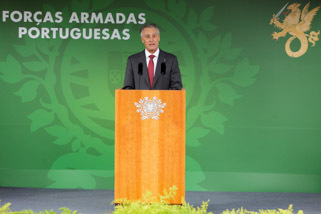
Before all else I would like to greet all the institutions represented here, and to warmly congratulate those who were distinguished with the 2012 Europa Nostra Prizes, for the quality of their work and by their dedication to the cause of cultural heritage.
I would equally like to mention how pleased I am for this ceremony to be held in a place so loaded with history as this location – a monument of rare beauty that, such as the magnificent tower facing us, the Tower of Belém, comprises the list of UNESCO’s World Heritage and, apart from that, clad with very special significance.
The Jerónimos Monastery is deeply connected with the feats of the Portuguese navigators, by which Europe, five centuries ago, was opened up to the remaining world.
It was here that the phenomenon of globalization began, which would link the Old Continent to the four corners of the world, thus accessing the encounter of civilizations and cultures.
As written by the poet Fernando Pessoa, it is from here that Europe views the West, «and the face that sees it is Portugal».
This was also the location where, in 1985, the Treaty of Portugal’s Adhesion to the European Economic Community was subscribed, consecrating our condition as a democratic State and as a nation that fully shares the values on which the European project is based.
It would be difficult to find a more adequate place to welcome our visitors, and suitably celebrate the actions and best practices that keep alive, in the European area, the legacy of the generations that preceded us.
The European Union is, doubtlessly, a project that looks to the future, a project that invests in its citizen’s standard of living and in the progress and development of its peoples. But it is also a project based upon an incomparable collection of tangible and intangible values, which give this mosaic formed by the European nations the possibility to assert itself with its own identity.
In the vestiges of the past we do not just find the lines that show the spiritual borders of each of our peoples, and that strengthen their internal cohesion and their identity. We equally find the common roots, the proximity and the dialogue that has always been the final means of accord in the Continent.
All the great moments in the history of Europe have resulted, on the one hand, by a return to the matrix of values that is common to all of us and, on the other, in the intensifying of contacts and interchange, namely cultural, whether between several countries or between several generations.
It is thanks to that matrix and to that dialogue that we have all been able, for quite a long while, to call this Europe, Europa Nostra. A Europe that was able to transform its moments of decadence in moments of renaissance. A Europe that was able, imbued in the past, to overcome crises that threatened, many times, to completely devastate it.
If other reasons did not exist to celebrate Europa Nostra and applaud the work carried out by so many organizations, on behalf of conserving its heritage, all that would be necessary would be the meaning of the monuments that identify us as a community driven to continue united and in construing a prosperous future with a dialogue, which corresponds to the best moments of its past.
I thus renew my congratulations to all the institutions that have been awarded the Europa Nostra Prizes, expressing our recognition for the excellence of their work and for their dedication, as private individualities and associations, to a task that is in the greatest of public interest.
Allow me to address a very special greeting to the persons and institutions involved in the restoration of the six organs of the Mafra Basilica, a Portuguese work very justly included in this year’s prize winners.
To end, I also want to congratulate all the institutions involved in the awarding of prizes and in organizing the Conference that Europa Nostra is carrying out in Lisbon this week, particularly the National Cultural Centre that continues to be, amongst us, a remarkable example of what can be achieved by citizens on behalf of heritage and culture.
To them all, our very deep thanks.
© 2006-2016 Presidency of the Portuguese Republic
You have gained access to the records of the Official Site of the Presidency of the Republic from 9 March 2006 to 9 March 2016.
The contents available here were entered in the site during the 10 year period covering the two mandates of President of the Republic Aníbal Cavaco Silva.